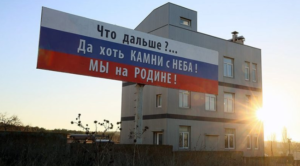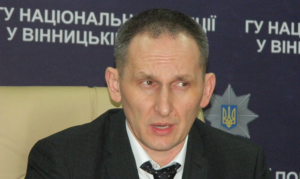Megan Smith is a Legal Officer at REDRESS, a British NGO that, among other things, works with civil society organizations from other countries to help draft sanctions submissions to the UK government under the recently adopted Magnitsky Act. Megan works specifically on the use of Magnitsky sanctions to hold those committing serious human rights violations accountabile. In her recent efforts, Megan has developed and campaigned for solutions to the lack of funding for reparations for victims of serious human rights violations, focusing on the use of sanctions and asset recovery mechanisms.
An experience of Megan Smith and REDRESS can be useful for Ukrainian human rights activists who have recently promoted the idea to impose sanctions for violations of human rights in occupied Crimea and Donbass, and for Ukrainian lawmakers and experts working on reloading the Ukrainian sanction policy. Megan Smith was interviewed by Yulia Kazdobina, expert of “How sanctions work” special project of the CJA and the head of the Ukrainian Foundation for Security Studies.
Julia Kazdobina: Could you say a few words about your organization, what you do and what is your organization’s role in the British sanctions policy process?
Megan Smith: REDRESS is an international human rights NGO with offices in London and The Hague. We focus on securing justice, including reparations, for victims of torture and other gross human rights violations. As part of this work, we have a project on the use of Magnitsky sanctions as a mechanism to deter and provide accountability for human rights abuses. As part of this project, we train and work with NGOs all over the world, to assist them in filing evidence submissions with the UK FCDO seeking sanctions on perpetrators; we file our own submissions to the FCDO, and we act as the Secretariat to the UK All-Party Parliamentary Group on Magnitsky Sanctions.
Julia Kazdobina: Different countries take different approaches to the targeted sanctions for human rights violations. The Global Magnitsiy act of the United States targets both human rights violations and high-level corruption. The EU imposes sanctions for human rights violations only. What is the policy of the British government?
Megan Smith: The UK regime encompasses both human rights and corruption.
Julia Kazdobina: How do you choose targets to appear on the sanctions list? What are the criteria?
Megan Smith: The decision as to whether someone should be sanctioned is ultimately at the discretion of the Foreign Secretary. However, under the legislation, for a sanction to be imposed on an individual (under the human rights regime), there must be “reasonable grounds to suspect” that this individual is “involved” in violations of the right to life, the right to be free from torture and/or cruel inhumane and degrading treatment, and/or the right to be free from slavery. The definition of an “Involved person” is very broad and includes those directly responsible, those who finance or support an abuse, who profit from an abuse, conceal evidence of an abuse, or who have responsibility for investigating or prosecuting an abuse and fail to do so.
In addition, the minister must be satisfied that the designation is “appropriate” having regard to the purposes of the regime – to deter and provide accountability for human rights violations – and the impact of sanctions on the individual. This is where you see an attempt to balance the protection of victims with the rights of the sanctioned person.
The FCDO has also published a non-exhaustive list of policy factors which will feed into a sanctions decision. These include: the nature of the victims, the seriousness of the conduct, any other international action, the human rights priorities of the UK Government (which include torture prevention), and any other accountability mechanisms which could be used.
Julia Kazdobina: What’s the basis for the decision to remove people from the list?
Megan Smith: There is an obligation on the minister to review all the designations every three years which is a lot less frequent than the EU. In the EU, I think, that’s a year. And the idea is that if somebody no longer meets the criteria they should be delisted. And that is also a continuing obligation. It’s also possible for designated people to challenge their resignations. That’s a twofold process. so, one they make an administrative complaint to the Minister, he needs to consider that, and if the Minister decides not to change the designation or not to remove them, then that decision can be challenged before the courts. The court will review the merit of the decision itself and they will look into the traditional public law grounds, say, for example the decision was unreasonable or whether the procedural fairness wasn’t followed.
Julia Kazdobina: The Ukrainian sanctions policy is criticized for its non-transparency. It’s often not clear why this or that person or entity ended up on the list. Would you describe the British policy as transparent? And could you give and example of how it works, how is the transparency ensured?
Megan Smith: I think that transparency of the lack thereof is the issue related to every sanctions regime. I think it’s due to the nature of the information authorities are often dealing with. Which is related to National Security of the prevention of crime. But I think in a lot of sanctions regimes the transparency could be improved and I think that applies safely to UK regimes. In terms of the transparency that exists, if somebody is designated the government is obliged to publish a statement of reasons on the Internet. And that is usuallu ua very short paragraph with very high-level reasons as to why they were sanctioned. And if somebody isn’t sanctioned the government will not always say why, so from the NGO Perspective the It’s not always clear why someone hasn’t been sanctioned and what the pitfalls are on making submissions. If somebody wants to challenge their designation, they can request information from the government as to why they’ve been sanctioned. But evidence can be withheld on the basis that it raises concern of national security or potential crime. There’s also policy concerns. And if somebody is challenging their designation at the court level, there could be the so-called “closed material proceedings”, so if the information on which your designation is based is really sensitive in terms of national security the approach is to give the sanctioned person a high-level summary of what the evidence is but then allow the judge or the judges to look at evidence itself in closed proceedings. At least there is that kind of assurance that the decision maker has seen all of the evidence.
And I think from our perspective one thing that we would like to see improved is, because it is inherent in all sanctions regimes that a l of the information is sensitive and can’t be disseminated widely, I think it would be important to have another form of objective form of oversight. So we think it would be a good idea in the UK to have some form of body whether that’s a committee or a commissioner who has potentially special powers and privileges to see that information and could scrutinize on an all-day basis the use of the sanctions regimes. Not just when someone comes to challenge it but throughout the lifetime of sanctions.
Julia Kazdobina: I don’t think this is even discussed here, I mean someone scrutinizing the sanctions. But maybe this is a good idea for us as well.
Megan Smith: I don’t know much about the US regime so I won’t try and remember but there is definitely an oversight mechanism in the US which we don’t have in the UK. So, we are doing a bit more thinking around it and trying to push it, the policy.
Julia Kazdobina: Have there been any big well-known cases when somebody was sanctioned and that was not right?
Megan Smith: As far as we know, there have been non under corruption and human rights regimes. But there are fairly new and I am sure that there will be cases in the coming months, years. But not yet. It will be really interesting to see how this all plays out.
Juia Kazdobina: Human rights sanction and corruption sanctions, they are individual sanctions. People of a more hawkish nature tend to see them as inefficient and weak. They believe that sectoral economic sanctions are more efficient. You probably do believe that this is not true. How would you respond to this kind of criticism?
Megan Smith: We have definitely heard this argument many times before. And I understand that point of view but like you say we would disagree. We think sanctions are effective. I think there are a couple of points to make. One will concern sector wide or country wide sanctions and the impact that it has on the individual people. We’ve seen this time and time again. And I am not saying that targeted sanctions could not have effects on individuals, of course they do but I think it’s less of a concern. I think, coming from the perspective of a human rights lawyer, we often rely on traditional justice mechanisms, our national law and international courts. And this is incredibly important and, in some cases, really effective. If can be slow and it can be cumbersome and governments don’t always act upon the judgements, I think that’s the case at domestic and international level, and that really leaves and accountability gap. And I think sanctions, targeted sanctions, can to some extent fill that gap. And from a victim’s perspective, we operate in countries where often the fact that human rights violation occurred is denied. We have families of victims or victims themselves where they are saying, “the government even isn’t going to recognize that this has happened to me”. And having another country sanctioning someone that international recognition is in itself very important both to deter and provide accountability for. And I think that’s really important. I think it’s also interesting to see the reaction to sanctions. The sanctions related to Uighur genocide in Xinjian. The fact that .. sanctions were imposed of proactive MPs, human rights lawyers, journalists in the UK in response to the UK sanctions I think than in itself shows that they have some efficacy. You often don’t have governments reacting so sharply to judgements of international courts but they reacted very strongly to those sanctions.
Julia Kazdobina: You mean sanctions imposed by China in response to the UK sanctions, right?
Megan Smith: Yes, exactly. China sanctioned a few MPs who were very vocal about imposing sanctions on China, a human rights lawyer, and journalists. So, I think that showed that they did have some impact.
Just one caveat. I just want to say that I am really keen to emphasize that sanction should not replace other kinds of accountability. For deterrence, it’s really important that we use all of the tools that we have to deter and provide accountability for human right violations. That includes judicial process, UN bodies, special procedures. But I think sanctions should be seen as one tool in a toolkit to use in this sort of situations.
Julia Kazdobina: when you talk about humanitarian consequences of countrywide sanctions, could you give an example? What kind of things are you talking about? In the beginning you referred to this kind of sanctions having consequences. So what kind of consequences are we talking about?
Megan Smith: We have seen this in the countries like Iran or Venezuela, for example. Those sanctions they lead to discussions about having to provide humanitarian aid. These discussions concern Afghanistan as well. And that’s not to say that targeted sanctions do not have that impact but I think that’s less of an immediate risk than countrywide sanctions.
Another criticism of human rights sanctions and sanctions generally is that they are a violation of a state sovereignty. So, what would you say to that?
Megan Smith: I think that’s an interesting argument but I would disagree. The way that I see it, it’s actually an exercise in state sovereignty of the sanctioning country. Those targeted sanctions are primarily about what happens in that jurisdiction. When we are talking about the UK targeted sanctions, it’s about what happens here in the UK. If somebody is sanctioned, it’s about that person not being able to come to the UK, it about that person not being able to use their assets in the UK or to use the financial systems here in London or property market in London. So, really, it’s about the UK state sovereignty. It’s not about interfering with sovereignty or jurisdiction of other countries.
Juila Kazdobina: I would like to ask about the Crimean situation. I am not sure how familiar you are with it. Large scale human rights abuse documented by the Ukrainian government, NGOs, United Nations and other international organizations has been taking place in Crimea since the first days of its occupation by the Russian Federation. However, no relevant sanctions regime has been imposed. What do you think is the reason?
Megan Smith: I must confess I do know about the situation but I would not want to speculate about the reasons behind the absence of the sanctions regime particularly not in the context I am not an expert in by any means. I can answer a part of your question on what the Ukrainian government and the civil society can do.
Julia Kazdobina: that was the second part of my question.
Megan Smith: I think I can talk about that a lot more comfortably. This is me telling you what you already know but the most effective thing that we’ve seen in times of advocating for the existence of sanctions regime but also the imposition of sanctions themselves is coordinated multilateral action. You take the case of the UK sanctions on Chinese officials in relation to the Uighur genocide. China is currently standing as a quite a strong trading partner for the UK and a priority partner. Two years ago I never would have imagined that the UK would impose sanctions on the Chinese officials. But they did. And it was because there was such a coordinated advocacy campaign. There were NGOs who had experience on the ground in China who could provide information and evidence, and then there regional NGOs who were building on that and then there were international like us. We were all working together with different expertise, different knowledge we were rooting for this. Providing evidence as to what was happening, but also providing the policy argument as to why these people should be sanctioned and what the consequences of that would be. And I also think the fact that there were those conversations happening in other countries, in the US, for example. I think that really strengthened it. And I think this just goes to show that this is as much about policy advocacy as it is about the legal argument as to why there should be sanctions. And I think this coordinated approach is so important.
And in terms of what we can do at Redress, so if there are NGOs that want to argue that there should be sanctions imposed by the UK in relation to the individuals involved in the situation in Crimea, we can provide training on the UK regime, we can provide some advice on specific submissions. We also work with our colleagues in the US and the EU because we think that the kind of coordination between these three key jurisdictions is really important. So, we can work with them and put NGOs in contact with them to help with submissions in those two jurisdictions as well.
Julia Kazdobina: Have there been any cases when a foreign NGO came to you asking for help and you organized a coordinated campaign with the EU and the US?
Megan Smith: yes, we kind of refer cases to each other. We have an NGO, for example and American NGO, we work with our EU partners on a submission and then they come to us and we amend their submission and we follow on in the EU and make sure that we use a coordinated approach. And if we make a submission to the UK, we’ll flag, we’ll say that they’ve been sanctioned by the US and the EU already. Or we’ll say that we have submitted them on a case file and that they are being considered. We already came to strengthen our coordinated approach since it’s the most effective way of working, I think. I obviously should say that there will be different policy considerations for different governments, they are not always going to make the same decisions because they have their own relations with certain governments or individuals but it’s always good to start from the position of coordinated action.
Julia Kazdobina: Are there any efforts to assess the efficiency of the sanctions?
Megan Smith: That’s a really interesting question. This is something that we are really thinking about. Obviously, they are quite new regimes, and you are often dealing with quite complex issues, so we need a bit of time to see how they work. There is something that we are really keeping an eye on. And we do know that individuals who are sanctioned are realizing the impact they have on their ability to access financial markets, so they are having the impact. We are confident that sanctions will have the effect of deterring and providing accountability for, but I think we just need to give it a bit more time to let the regimes to really take hold.
Julia Kazdobina: thank you very much!







